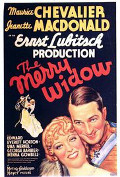
USA 1934
Directed by
Ernst Lubitsch
99 minutes
Rated G
Reviewed by
Bernard Hemingway

The Merry Widow
Although Ernst Lubitsch's film gives the 1905 operetta by Franz Lehar a lavish treatment precisely for this reason his version of The Merry Widow is a rather dated production (even in its day it was not successful at the box office failing to recoup its $1.6m production cost).
The film combines light operetta, provided by Lehar’s music (enhanced with lyrics by Lorenz Hart and Gus Kahn) and Jeanette MacDonald’s soprano warblings with comic elements provided by Maurice Chevalier, Edward Everett Horton and George Barbier in performances which lean the film towards the cut-price farcical style of The Marx Brother’s Duck Soup (1933) with the kingdom of Marshovia reminiscent of the latter’s Freedonia.
Set in Central Europe in 1885 Marshovia is faced with bankruptcy when the country’s richest woman and its biggest tax-payer, the widow Sonia (MacDonald) decides to end her mourning and goes to Paris. To stop her falling prey to gold-diggers King Achmed (Barbier) sends captain of the guards Count Danilo (Chevalier) to woo her back. There’s the standard case of mistaken identity before the two duly fall in love and the curtain falls.
Chevalier and MacDonald had already been successfully paired in 3 previous movies (Love Me Tonight and One Hour With You in 1932 and The Love Parade in 1929) indeed Horton, Babier and Lubitch were all regular workers in this style of production and it seems effortless although the leads apparently did not get on.
Lubitsch characteristically does the Gay Nineties proud aided by rich, even overstuffed, production design by Cedric Gibbons and gorgeous costumes by “Adrian” (it is unfortunate in this respect that the film is in black and white) but unless you are particularly taken by Lehar’s music, despite its felicitous moments this is fairly heavy going.
Want something different?





